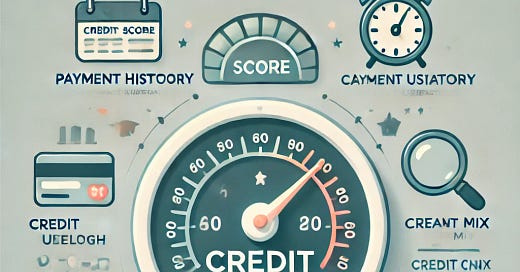Hey Wealth Enthusiasts,
Ever feel like your credit score is a mysterious number that holds the key to your financial future? Like a compass guiding your ship, your credit score plays a crucial role in navigating the waters of borrowing and lending.
But what exactly is a credit score, and why should you care about it?
Decoding the Mystery:
Your credit score is a three-digit number that summarizes your creditworthiness, basically how likely you are to repay borrowed money. Lenders use this score to assess the risk of lending to you. A higher score generally means you're considered less risky, which can translate to lower interest rates, better loan terms, and even greater approval odds for credit cards and apartments.
The Factors that Steer Your Score:
Several factors influence your credit score, including:
Payment history: Do you pay your bills on time? This is the most significant factor, accounting for about 35% of your score. Late payments can significantly drag down your score.
Amounts owed: How much debt do you have compared to your credit limits? High credit utilization (owing a large percentage of your available credit) can negatively impact your score.
Length of credit history: How long have you had credit accounts? A longer credit history generally demonstrates greater financial responsibility.
Credit mix: Do you have a variety of credit types (credit cards, loans, etc.)? A diverse mix can positively influence your score.
New credit: Have you recently opened several new credit accounts? Too many inquiries in a short period can lower your score.
Charting Your Course:
Understanding your credit score is crucial for making informed financial decisions. Here are some steps you can take to improve and maintain a healthy score:
Pay your bills on time, every time: Set up automatic payments or reminders to avoid late payments.
Keep your credit utilization low: Aim to use less than 30% of your available credit.
Don't close old credit accounts: Even if you don't use them, keeping old accounts open can help your credit history.
Limit new credit applications: Only apply for credit when you need it.
Monitor your credit report regularly: Check for errors and signs of identity theft. You can get a free credit report from each of the three major credit bureaus (Equifax, Experian, and TransUnion) once a year at AnnualCreditReport.com.
Staying on Course:
Building and maintaining a good credit score is a journey, not a destination. By understanding the factors that influence your score and taking steps to improve your credit habits, you can navigate the financial seas with confidence and reach your financial goals.
Happy sailing,
Rishi





